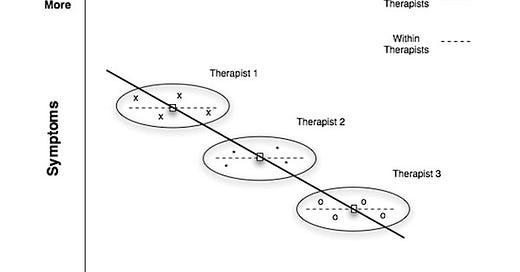Frontiers Friday #60. Characteristics of Highly Effective Therapists (Part II)

Frontiers of Psychotherapist Development
Frontiers Friday #60. Therapist Effects: Characteristics of Highly Effective Therapists
Last week, we talked about , that is, the reliable differences between therapists based on client outcomes.
Today, we look at the characteristics that are common in highly effective therapists that contribute to differences in client outcomes.
🤷🏻♂️Psychologically Minded and Expecting More
This 1996 study analysed 28 therapists in the Treatment of Depression Collaborative Research Program (TDCRP) dataset found the following:i. The more effective therapists were more psychologically minded, as opposed to having a biological orientation (i.e., medication, electroconvul’ sive therapy),
ii. Expected more sessions than did moderately and less effective therapists.These differences were independent of the four types of treatment provided (cognitive behavior therapy, interpersonal therapy, imipramine medication plus clinical management, and pill placebo plus clinical management) or the research site. The difference in effectiveness was also not related to the therapists’ level of clinical experience.
✋ Who Contributes the Most to the Alliance?
We've all heard about the importance of working alliance. But who contributes the most to it? The client, the therapist, the fit between both parties?
In an elegant study, Baldwin, Wampold, and lmel (2007) were able to disentangle the alliance—outcome correlation, and found that the alliance formation was not due to the client, the interaction of client and therapist, nor the consequence of early improvements. Rather, the researchers found that it was largely due to the contribution of the therapist in the alliance.
In other words, therapists who, on average, are able to establish agreement on goals, tasks, and level of bond with the client (Bordin, 1979) performed better than therapists who did not form as strong a therapeutic engagement with their clients.
Rarely do we see this in social sciences, but a whooping 97% of the variance in therapists explained the formation of good alliance, as rated by clients.
Here's a grab from Baldwin's et al.'s paper:
⚠️ Skills in Handling Difficult Interactions
A handful of studies by Tim Anderson and team have showed that the more effective therapists are reliably more able to handle difficult interpersonal situations in therapy than their peers.
They measure this with the Facilitative Interpersonal Skills (FIS) task and correlate that with therapists outcomes.
In a randomised study that my colleagues and I did in 2015 (still not yet published, I'm sorry. It's a slow drag when I'm not in academia), we were able to improve therapist's ability using a deliberate practice framework. Stay tuned once we can release it.
😱 Self-Doubt
Two studies here.
The more effective therapists seemed to. be a self-critical bunch. In the Vanderbilt psychotherapy research study, Najavits and Strupp (1994) found that effective therapists were more self-critical and reported making more mistakes than less effective therapists.
In a later study, therapist-reported professional self-doubt (PSD) was found to have a positive effect on client ratings of working alliance, with higher levels of PSD suggesting an open attitude toward admitting their own shortcomings (Nissen-Lie, Monsen, & Ronnestad, 2010).
More about Doubt.
⏸ Words Worth Contemplating:
"Measure what they do, not what they say.”
~ K. Anders Ericsson, personal comms.
Reflection: We tend to default to "Working Alliance = Relationship." Bordin (1979), however, points out that there are 3 key elements under the hood of a good relationship in therapy: 1. Agreement on goals, 2. Tasks, and 3. Emotional bond. Emotional connection is primary, but what about the therapeutic tasks and consensus of focus in therapy? How do we take care of this trifecta, since it impacts outcome dramatically?
Scott Miller and I are now getting ready for our 4th cohort of the Deliberate Practice Web-Based Workshop, slated to kick off late Nov 2021. If you are keen to save a spot, drop me an email to be on the waitlist (Click here to preview the course. We've made some modules free to preview)
BIG HUGS TO NEW SUBSCRIBERS WHO WANT TO BE AT THEIR FRONTIER!
If you've just joined us, I'm glad you can join us at the "bleeding edge." Feel free to check out the back catalogue of Frontiers of Psychotherapists Development (FPD).
And if you want to see past newsletters, click here.
In case you missed it, see the most recent missives
(3 Parts)
(3 Parts)
(4 Parts)
Unintended Consequences (2 Parts)
(4 Parts)
(3 Parts)
(5 Parts)
(6 Parts)
My other blog site is called FullCircles: Reflections on Living
By the way, don't feel bad if you want to unsubscribe to this newsletter. This might not be for you. The last thing I want is to add to the anxious clutter of our inboxes.



